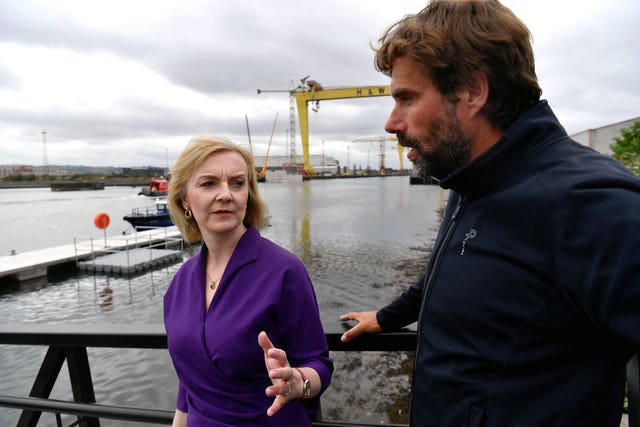
Vanessa Feltz 3pm - 6pm
26 September 2022, 00:44

The zero-emission vessel uses hydrofoil technology to lift it above the waves.
Design plans for a zero emission 100% electric “flying” ferry have been unveiled.
The EF-24 Passenger vessel uses cutting-edge hydrofoil technology to lift the craft out of the water, enabling it to sail above the waves.
Maritime design company Artemis Technologies has described it as a “game changer” for the global high-speed ferry market.
Raising the hull above the water dramatically cuts drag, delivering estimated fuel cost savings of up to 85% compared to conventional diesel-powered ferries.
Artemis’s eco-friendly eFoiler technology generates zero emissions when the ferry is sailing while also producing minimal wake and noise.
Aside from the environmental and economic benefits, the company says hydrofoiling also ensures a smooth ride regardless of water conditions, thus reducing instances of sea sickness.

Artemis Technologies, which is based in Belfast, is a spin-off from the Artemis Racing team that competed in the America’s Cup.
Its founder and CEO Dr Iain Percy is a two-time Team GB Olympic sailing champion and four-time America’s Cup veteran.
The ferry will come into service in 2024, running a pilot service between Belfast and the nearby city of Bangor.
The 24-metre vessels will be able to carry 150 passengers. The first ferry built will be called Zero.

It will have a top speed of 38 knots and a battery range of 115 nautical miles at a 25-knots cruise speed.
The ferry, which was formally launched to the global market on Monday, is among several zero-emission vessels being developed by Artemis Technologies as part of a £60 million project to design and manufacture commercially-viable green transport solutions for the maritime industry.
Earlier this year, it launched what it hailed as a “world first” commercially-viable hydrofoil workboat.
The Pioneer can now be seen cruising above the waves on Belfast Lough outside Artemis’s manufacturing plant in the city’s docklands.
Like America’s Cup racing yachts, the technology involves attaching hydrofoil wings to the hull with vertical struts.
Much like a plane taking off on a runway, the underwater wings drive the vessel up and out of the water as it picks up speed.
Dr Percy believes Artemis can be a world leader in delivering transport alternatives for congested cities.

“The zero-emission ferry that will be seen departing Belfast in 2024, aptly named Zero, will be the first we build at our manufacturing hub in the city, but it is only the start,” he said.
“Many water-based cities around the world are grappling with the challenge of growing populations, congestion and pollution.
“The EF-24 Passenger can provide an immediate green transport solution that competes economically with road and rail in places like San Francisco, New York, Venice, Istanbul, Dubai and Singapore – anywhere around the globe that is seeking sustainable transport alternatives that balance the requirement for people to continue to move around with the need to reduce carbon emissions.
“Especially where new infrastructure is required like a new road or rail line, this ferry will not only be the cheapest, but also the fastest and least disruptive way to decarbonise transport networks in water-based cities”.
Artemis has partnered with Condor Ferries to operate the Belfast-Bangor pilot scheme.
The ferries will be fully accessible, with facilities on board including bike racks, cabin bag and overhead storage, baby-changing facilities and charging points.

The vessels will also feature a new high-speed collision avoidance system developed in conjunction with tech experts from Queen’s University Belfast.
Artemis leads the Belfast Maritime Consortium, which includes manufacturers, universities and local councils in Northern Ireland.
In 2020, the consortium secured £33 million of UK Government research and innovation funding, through the Strength in Places Fund, to support its work developing zero-emissions ferries.
Artemis is creating 125 jobs initially but has plans to sustain 1,000 new roles in the coming decade.
In August, UK Prime Minister Liz Truss toured the company’s manufacturing facility and watched the Pioneer workboat on Belfast Lough, on a visit to the city during the Conservative Party’s leadership contest.

Commenting on the design plan for the electric ferry, Northern Ireland Secretary Chris Heaton-Harris said: “My congratulations to Artemis Technologies and Belfast Maritime Consortium on unveiling the plans for this exciting zero emissions vessel.
“I recently visited Artemis’ headquarters. I am delighted that they are seizing the many opportunities that the development of green transport presents, and which the UK Government is committed to supporting through our Net Zero Strategy.
“The development of such world-leading technology will ensure that Belfast remains at the forefront of maritime innovation while providing a boost to the local green economy.”
John Napton, CEO of Condor Ferries, said: “As a leading operator of passenger ferries, we continuously seek to explore technology that will allow us to sail more sustainably and we know our customers are of the same mindset.
“Green vessels like the EF-24 Passenger ferry perfectly provide that clean alternative to traditional diesel ferries.
“We are thrilled to partner with Artemis Technologies and the Belfast Maritime Consortium to develop these vessels from concept to reality over the coming months, and look forward to being the first operator to set sail in 2024 with the world’s most advanced zero-emission foiling fast ferry.”